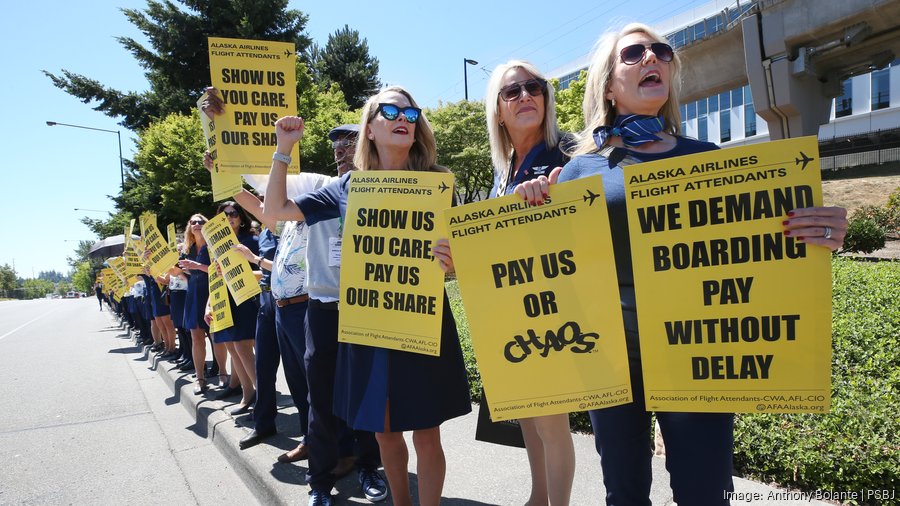Alaska Airlines (NYSE: ALK) is once again caught in heated negotiations with its workforce.
More than 150 of the SeaTac-based airline’s flight attendants picketed outside Seattle-Tacoma International Airport Wednesday calling for wage hikes and an end to labor rules that result in hours of unpaid work.
That includes ground and boarding time, when flight attendants are required to report as much as an hour prior to departure, help secure luggage and safety equipment and monitor the boarding process, Paula Isla-McGill, president of the Association of Flight Attendants-CWA Alaska Airlines union local in Seattle, told the Business Journal.
“We would like to have a fair contract where we’re compensated for all of our time on duty,” Isla-McGill said. “A lot of people in the public don’t realize that so much of our time is unpaid.“
She spoke over chants blasting the current 9-year-old contract. The union also seeks to address health care costs, sick leave policies, and 401(k) and retirement benefits.
Alaska adopted six new labor deals last year, including a contract with its pilots union in October, locking in wage increases and addressing job security concerns. Those changes added around $80 million in costs to its balance sheet, CFO Shane Tackett said in the company’s first quarter earnings call in April. The company is due to report its second quarter earnings next week.
Negotiations between Alaska and the union are scheduled to resume Aug. 14, with a systemwide “informational picket” planned for Aug. 15.
In an emailed statement to the Business Journal, the company said it is committed to reaching an agreement with the flight attendants:
The vast majority of our frontline employees are represented by a union, and our union partners make us a stronger company. Some off-duty Alaska Flight Attendants may be participating in informational picketing this week. We respect their protected right to engage in these activities and do not expect any disruption to our operation as a result.
We remain committed to reaching an agreement that recognizes the valuable contributions of our Flight Attendants and look forward to resuming negotiations next month.
Labor challenges aren’t unique to Seattle’s hometown airline, demonstrators said. Southwest Airlines and American Airlines pilots have both authorized strikes amid their recent labor negotiations. United Airlines reached an agreement with its pilots last week, increasing salaries and revamping benefits.
“It’s the same everywhere,” Isla-McGill said. “Our jobs have become increasingly demanding. Passengers have become more hostile to our flight attendants, and we would like management to recognize we’re putting our bodies on the line.”
One source of grievance for union members is the airline’s “milk run” between Seattle and Anchorage, Alaska, which makes seven stops to supply cities like Juneau and Sitka that depend on the flights to stay connected with the mainland.
The trip is a 12-hour workday for flight attendants, but often pays less than a direct flight from Seattle to New York, according to Carmen Jordan, who has worked for the airline for eight years, joining just as the last contract was being ratified. While workers are required to remain on the plane and clean cabins between each leg, they’re only compensated for the 35 minutes they spend in flight, she said.
A new contract would help stem the tide of attrition, said Aimee Nelson, who has been on the job for about a year and has already seen several of the people she graduated training with leave for other airlines or industries. Meantime, she has shot hundreds of places up the seniority list despite her brief tenure.
“Everybody’s feeling the pinch, from our first-year flight attendants to our top-of-the-scale flight attendants,” who have been with the company for decades, Isla-McGill said. “They haven’t had a significant wage increase for the past nine years. We are based in some of the most expensive cities in the country, and we’re feeling the pinch.”
Editor’s note: This article has been updated to include a statement from Alaska Airlines.
